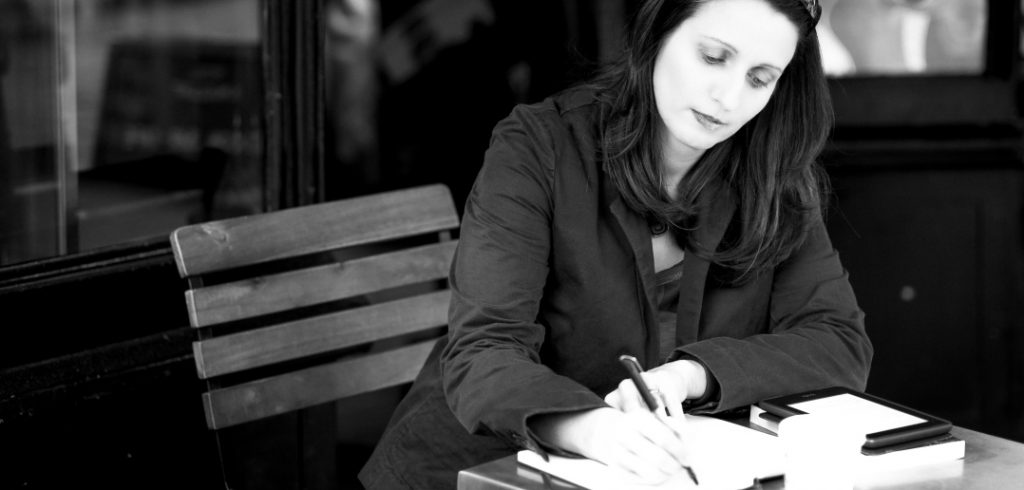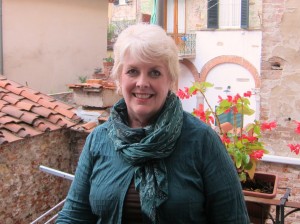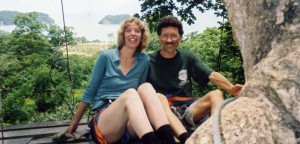Joanna Penn has succeeded at something most Barefoot Writers aspire to: Write and publish a novel. She’s now working on the third installment in her self-titled ARKANE action-adventure series with nearly 50,000 copies already sold.
She’s done something else Barefoot Writers aspire to as well, positioning herself as a top blogger and an expert in marketing writing.
Joanna’s fiction works are Indiana Jones-style mysteries. She dispatches readers on hair-raising quests to unheard-of locales. Sinister and deadly artifacts are often the key to surviving near-deadly adventures.
Her blog, TheCreativePenn.com, is also about survival. As a “how-to” for writers, it chronicles Joanna’s own ups and downs in finding her writer’s voice and positioning herself as an author worth reading. She generously shares insight into all she’s learned along the way, with an aim to spare both creative and commercial writers the mistakes she made. Her earnest effort paid off, as her blog was awarded the “Top Ten Blogs for Writers” title for two years running (2011 and 2012) by the website Write to Done from a pool of over 2,000 writer blogs.
Joanna’s blog recounts her initial efforts of putting pen on paper, and takes readers all the way to the transformative realization that she had a viable business model in the making. (For the record, she really does put pen on paper, taking a break from screen time occasionally to hammer out ideas the old-fashioned way in the Reading Room of the London Library, St. James’ Square. Laptops not allowed.)
Joanna now commands a multiple-stream income, proving that writing for both the commercial and fiction markets pays off. For her, making a living is no longer about fending off bills and pleasing someone else. It’s about following her passion.
I recently had an opportunity to interview Joanna, who is now based in London after 11 years in Australia and New Zealand. Our conversation follows.
***
How did you first get started as a writer? Was it always your dream?
Like many of us, I always wanted to be a writer. I’m a huge reader and my dream life was to read and write for a living. But I think I was stifled for many years by the idea that the only valid book is a prize-winning literary fiction novel. This may be a peculiarly British obsession, intellectual snobbery being one of our cultural faults. Since I couldn’t seem to write such amazing sentences, I gave up for many years, writing only in my copious journals. But back in 2007, after 10 years of being an IT consultant, I was totally miserable in my job and desperate to change my life. I started to investigate ways to change careers and in the process I wrote How To Love Your Job or Find A New One. That book changed my own life, as through it, I discovered self-publishing and a network of writers online. I have just re-released a revised version of the book as I have now achieved the goals I set out using the method I wrote about. It also helped release my blocks and I’m now focusing on fiction. I finally understand that writing is rewriting — and that commercial fiction is just as valid (and sells more!) than literary fiction.
What motivated you to start your blog for writers? (As opposed to simply writing your own books.)
Back in 2008 when I wrote that first nonfiction book, I made some huge mistakes that cost me money, time, and heartache. For example, I didn’t know about print on demand, so I did a print run which cost several thousand dollars. There were a lot of problems with the printing and then I didn’t have any way of distributing the books. I also didn’t know about marketing. So I was determined to learn about all these things, but also to share what I was learning so other people wouldn’t make the same mistakes. I started my blog, TheCreativePenn.com, in December 2008 as a way to share lessons learned, and from that I began to get speaking appearances and it has spiraled from there. The primary purpose of the site is still to educate and share lessons from the writer’s journey, but I am also now a full-time author-entrepreneur selling multimedia courses as well as speaking, consulting, and writing fiction.
You write and self-publish. Do you collaborate with anyone during the process, or is it all you?
I believe the definition of an independent author is someone who uses other professionals in order to produce a quality product, so collaboration is critical. I have two editors — a developmental and a copy-editor, as well as beta readers. I also have a professional cover designer. When I did print, I hired a print formatter, but I do my own e-book production through Scrivener software. Then of course, we still need distributors and I primarily use Amazon KDP, Kobo Writing Life, BookBaby, and Smashwords. But I don’t collaborate creatively with other authors on content at this point in my career, although I would consider it in the right situation.
Pentecost, the first in your ARKANE series — took over a year to write. How did you keep yourself motivated during that time?
I started Pentecost during NaNoWriMo in November 2009 and published it in February 2011, but I did have a full-time job during that time, so it wasn’t my only focus. I was also learning the nuts and bolts of writing fiction, which were all new to me. Motivation has never really been an issue as I was determined to make the book a success.
Now, writing isn’t a hobby, it’s my business. I do find that blogging and Twitter are motivating though, as you see other authors getting 2,000 or even 5,000 words done in a day and you feel you have to get words on the page to match them. People can follow the #amwriting tag on Twitter to see what I mean. I want to publish at least one novel a year, so I set deadlines and goals in order to achieve that.
You’re clearly an adventure-seeker, based on the photos from your website. What’s been your wildest real-life adventure yet?
I’m definitely an experience junkie and I love to travel! I’m a PADI Divemaster and I’ve had some amazing experiences underwater in Western Australia and also in New Zealand. Probably the most exhilarating was a drift dive through a canyon off Fiji filled with reef sharks, and the most terrifying was a night dive on the Barrier Reef with a school of giant barracuda. They have seriously menacing teeth!
But I always like to push my comfort zone and learn new things. Sometimes it’s harder to face internal challenges. One of the last trips I did alone was to India and at Varanasi I watched bodies burn on the ghats. That was wild in a whole different way!
I’m a fellow pinot noir lover — what’s your favorite label?
New Zealand’s Peregrine estate in South Otago, probably the Saddleback, although I’ve never had a bad bottle from that vineyard. I hope we can have a glass sometime!
Absolutely. Now, you rebranded yourself as an author halfway through your journey by changing your author name from “Joanna Penn” to “J.F. Penn.” Why? Has the decision served you well?
There were a couple of reasons for this. Firstly, I received several reviews from men who said they were surprised that a woman would write such violent scenes, and that I seemed far too nice a person to write of burning nuns alive (Pentecost) or ritually murdering children (Prophecy). I don’t want my gender to have anything to do with whether or not someone buys a book. I also write in the action-adventure thriller genre, which is mainly populated with men, so I thought a gender-neutral author name would be a good way to avoid the issue. J.K. Rowling went with initials for the same reason. For anyone wondering, my middle name is Frances, so this is my real name, not a pen name as such.
The second reason is a branding thing as I have the nonfiction career change book under Joanna Penn and also intend to write more nonfiction. By having a different author name, you can segregate how books are shown on Amazon and other stores. I now have website dedicated to my fiction writing and a separate mailing list, so the branding decision is going well so far.
You mentioned you wrote your first fiction novel as part of NaNoWriMo, 2009. What was it about that challenge that finally prompted you to follow your dream to write?
Funnily enough, I think it was the community that I was mingling with by that stage. I had started TheCreativePenn.com and was blogging about writing in terms of nonfiction but I wanted to expand my expertise. I had also done a podcast on unblocking and that helped me face my own fears (of writing something truly terrible!). I also read Anne Lamott’s Bird by Bird, where she says it’s important to write “shitty first drafts.” NaNo is great because it frees you from expectations of creating a masterpiece. You can write 50,000 words of crap and maybe something will come of it, maybe it won’t. I wrote 20,000 words and the kernel of the novel was born, although maybe only 2,000 words of that made it into the final version. I’m thinking of doing NaNo again this year to create a new project and challenge myself on word count. I haven’t done a 50,000-word month, so perhaps this year I can achieve that!
What was the first step you took in getting your name out there and building recognition and a following?
I sold about 100 copies of that first nonfiction book before I understood that I needed to learn marketing! Seriously, it took a while for the penny to drop. So, first I tried traditional media. I did press releases and made it onto national TV, radio, and newspapers, but still no impact. So after eight months of that, I went online and learned about blogging because of the ability to have incoming links over time.
TheCreativePenn.com was my third blog; the other two fell by the wayside. I understood content marketing from the start, so I was happy to write and be useful and see what happened. I still recommend blogging as my #1 long-term marketing strategy along with building an email list.
Then I started a podcast (it’s now on episode 135 and on iTunes), mainly in order to learn from experts and share what I was learning with others. The next step was discovering Twitter and then video blogging. I think that the multimedia channels of audio and video have probably helped me stand out in a crowded text-based market. But each step had a few months in between as I learned and investigated. Tools change, but I’ve basically kept to the same principle — be useful, interesting, and consistent over time.
You use social media to attract publicity and fans. What’s your favorite platform?
It has to be Twitter. I am @thecreativepenn and I really use Twitter in two ways. Firstly, my feed is basically a news channel for writing, publishing, and marketing. I read a lot of blogs and tweet useful articles. The second way is for connection and peer support. I have found pretty much all of my podcast interviewees on Twitter and many of them have become good online friends. Some people may think online friendships are shallow but it’s just not true. You can take them further with Skype and later meeting in person, but you already feel you know them. I am an evangelist for Twitter! I have just started using Pinterest for my fiction and I’m loving the visual medium after so much text.
You’ve put yourself out there in a big way — featuring live interviews on your website, tweeting over 23,000 times, and attracting nearly 30,000 followers. What self-promotion effort has given you the biggest payoff?
If it was just self-promotion, I would have given up years ago! My main focus still remains to be useful or interesting so everything I am blogging about, tweeting, or sharing is for that reason. The blog wasn’t started as marketing, it began because I was crazy mad at getting ripped off and heartbroken at not selling any books. The podcast was started, and continues now, as a way for me to learn from experts and in the process, share it with others. I am a learning sponge. I must learn something new every day, so I enjoy sharing that.
So to answer your question, let’s call it marketing, since I do have a business and make income from the site. The biggest payoff is still blogging as it consistently brings me traffic and builds long-term fans. Everything else is peripheral and brings people to my hub, my blog, and my email list.
To promote my fiction, I blog through my author website. But I think the best marketing for fiction is:
- Professional editing and cover design so the book can sell itself
- Amazon sales page optimization and using the correct categories (so there is an existing target market that fits your genre)
- Reviews on Amazon, Goodreads, and other sites. I review all books I love at these sites and that’s critical for authors
- Everything else is extra and I do a lot of the rest too, but many fiction authors are successful without the effort in marketing
You spent 13 years in an office as an international business consultant, complete with commute and lunch meetings. What was the hardest part about transitioning to a writer’s life where you’re the one in charge?
I’ve been a contractor for many years, so I was always in charge of my time, but the biggest issue for me has been the change in income, which I have found (to my astonishment!) relates directly to my self-esteem. I was at the top of my ladder before and paid accordingly. Now I am at the bottom of a new ladder and again, paid accordingly! I have significantly downsized to make this change, but it has taken some adjustment. I see from your story that it took three years to get to six-figures and I expect it to be the same for me.
Don’t get me wrong though. I am absolutely overjoyed to have left that life, mainly because I could never see the point in what I did. IT is soul-destroying because everything you do is over-written within a few years. Nothing remains and there is little creativity in the daily grind. I’m so excited as a writer to build a body of work over time that endures, and to still be writing when I’m 90! I know that my income will ramp up over time as I write and publish more, so this step is temporary, but the transition is hard. It was fantastic for me to go to Thrillerfest in New York in July because I met big-name authors at the top of the game — Lee Child, Jeffrey Deaver, Lisa Gardner, and others. I see them further up the ladder, now I just have to climb the rungs too.
Now that you’ve signed with an agent, will you still be doing your own self-promotion?
Absolutely. It’s not an agent’s job to promote and as I write this, the books haven’t sold to a publisher so nothing has changed as yet. But I love marketing and I also believe it’s the author’s responsibility to build their own career and to take care of their own business. No one else cares as much as you do about your books. So even if I get a big publishing deal, I will continue to do my own marketing. Plus I will continue to self-publish other works as I am determined to be a hybrid author, someone who blends both publishing options for the best of both worlds.
This September marks the one-year anniversary of your life as a full-time writer-entrepreneur. How will you celebrate?
I prefer milestones, rather than dates. I recently celebrated signing with my agent with a new necklace and champagne. That was a milestone. But the one-year anniversary for the business is not significant yet as I have not achieved my stretch targets. I just wrote a post on how the Olympics are a great measuring tool for us. Four years is long enough to see significant change, but short enough to remember where we were. In September 2008, I was nowhere. I had no business, no blog, no online presence. I hadn’t considered writing fiction. In September 2012, I am a full-time author-entrepreneur with two Amazon bestselling novels that have sold ~50,000 copies, signed with a New York agent, as well as an international speaker. So I’m excited about 2016 and will (hopefully) celebrate milestones before that!
Editor’s Note: Learn more about Joanna Penn at her fiction site, www.JFPenn.com, or follow her blog for writers at www.TheCreativePenn.com. You can also find her nonfiction book, How To Love Your Job or Find A New One, available free on Amazon Kindle.






